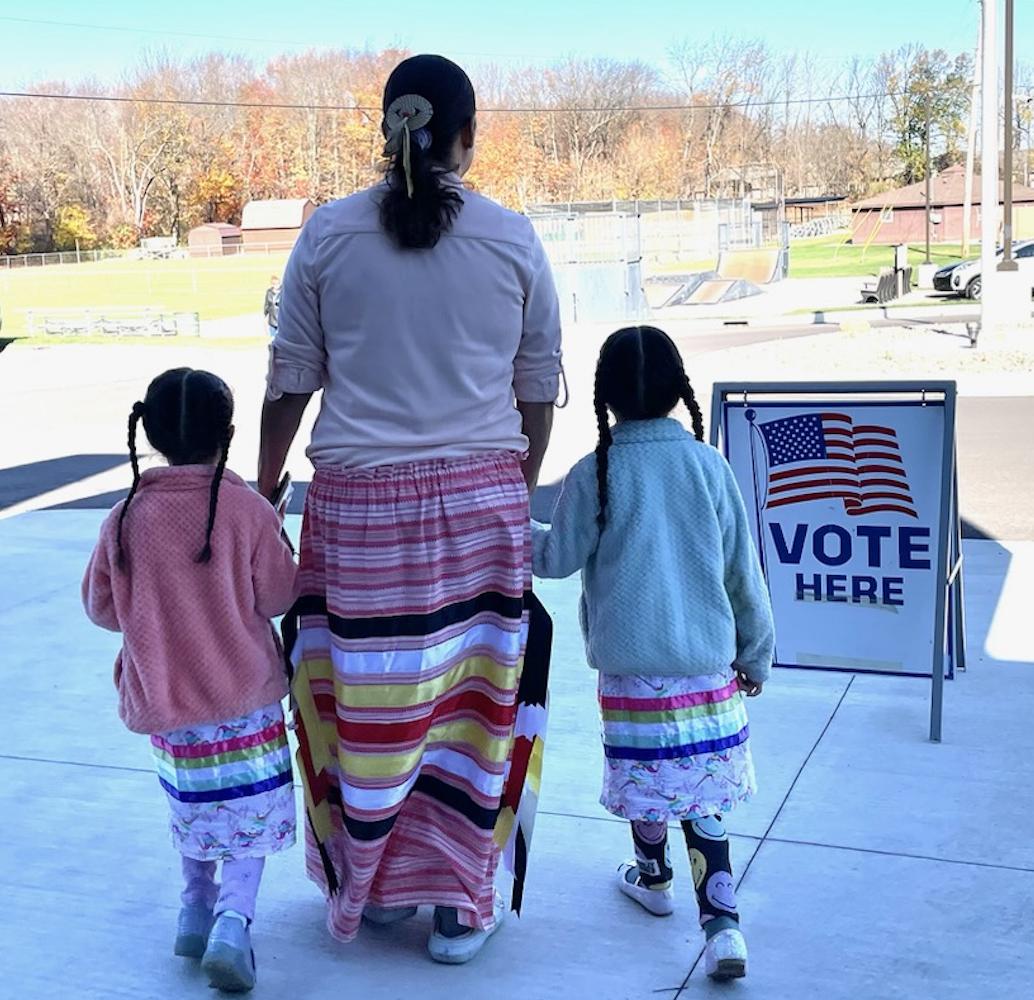
- Details
- By Dr. Stephanie Fryberg
Guest Opinion. Native Vote 2024. Each election cycle, exit polls are utilized to understand the voting demographics of the electorate. Individuals are asked to self-report various aspects of who they are – their age, race, geographic location, income, and more – as well as how they cast their vote. This polling is done to provide an immediate snapshot of how and why various groups of people voted.
This year, Edison Research conducted exit polling on behalf of the National Election Pool (NEP), a group of news organizations consisting of ABC, CBS, CNN, and NBC. The NEP prepared the exit poll questionnaire, and Edison Research administered it at 279 election-day polling places, 27 early in-person voting locations, and via landline phone, cell phone, SMS text message, and email.
Since Election Day, the members of the National Election Pool and countless other outlets, journalists, influencers, and more have reported on the results of the 2024 exit poll, which includes the claim that 65% of Native voters cast their ballots for the Republican Party.
Understanding how critical it is to sample the right communities in order to fully capture the scope of Native voices, the Research for Indigenous Social Action and Equity (RISE) team was immediately concerned with the veracity of this claim and the broader impacts it could have on our communities.
After further analyzing the various methodologies provided by NEP members and communicating directly with Edison Research, we believe that the sampling methodology used to capture the political perspectives of Native communities was flawed in the following ways:
- Zero of the 306 election day and early voting polling places included in the exit poll were on tribal land;
- The Native voter sample size of approximately 229 individuals is too small to confidently assess the broad voting pattern of the Native population across the United States;
- Urban and suburban voices were over indexed, with 80% of respondents reporting one of the two as their area type and just 19% reporting their area as rural; and
- The South was over indexed in the sample, with 35% of respondents reporting it as their region, compared to 21% reporting the East, 22% the Midwest, and 23% the West.
Without a deep understanding of how to address the unique challenges of accurately polling Native American communities, future research will only continue to misrepresent Indigenous voices in this country.
From our own work, including data from the Indigenous Futures Surveys (2020-2022), we know that Native voters are highly engaged, with a strong turnout in elections and high levels of political activism.
The Indigenous Futures Survey (IFS) is a far-reaching research project conducted in Indian Country with participation from over 6,400 Native peoples in the first year and 4,600 in the second. The nearly 11,000 respondents came from across the country, representing 401 tribes from all 50 states. We had a diverse and representative sample across age, gender and geography, and saw similar patterns of political identification across both samples.
Our findings show that 60% of Natives identify as liberal, 33% identify as moderate, and 12% identify as conservative. Just over half of our sample identified as Democrat, 9% identified as Democratic Socialists, 26% identified as Independent, and 7% of the sample identified as Republican.
Broader voting trends across the country show us that many communities shifted towards the Republican Party in this election, and there is a possibility that the Native Vote also could have followed suit. However, the knowledge that Native voices are rarely captured accurately in polling data coupled with the additional methodological context outlined above lead us to the following conclusions:
- This exit poll does not accurately reflect the voting habits of Native Americans in 2024, and these results should be met with skepticism even as they are reported as fact;
- Polls that fail to accurately represent Native American perspectives are not merely incomplete; they are misleading and potentially harmful; and
- The national media continues to lack accountability when analyzing and reporting on Native issues and misrepresents data that negatively impacts the visibility of Native people.
We call on pollsters and media outlets to overhaul their methodology for Native community engagement that reflects the diverse and vibrant voices of nearly 9.7 million Native people. The RISE Team and our partners stand ready to work with national leaders in this space to ensure that Native Americans are accurately represented in all data.
Dr. Stephanie Fryberg (Tulalip Tribes), Founding Director, Research for Indigenous Social Action & Equity Center (RISE) at Northwestern University and Professor of Psychology, Northwestern University.
Help us defend tribal sovereignty.
At Native News Online, our mission is rooted in telling the stories that strengthen sovereignty and uplift Indigenous voices — not just at year’s end, but every single day.
Because of your generosity last year, we were able to keep our reporters on the ground in tribal communities, at national gatherings and in the halls of Congress — covering the issues that matter most to Indian Country: sovereignty, culture, education, health and economic opportunity.
That support sustained us through a tough year in 2025. Now, as we look to the year ahead, we need your help right now to ensure warrior journalism remains strong — reporting that defends tribal sovereignty, amplifies Native truth, and holds power accountable.
 The stakes couldn't be higher. Your support keeps Native voices heard, Native stories told and Native sovereignty defended.
The stakes couldn't be higher. Your support keeps Native voices heard, Native stories told and Native sovereignty defended.
Stand with Warrior Journalism today.
Levi Rickert (Potawatomi), Editor & Publisher
